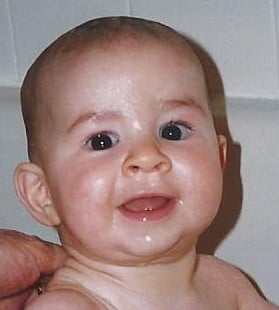I’m a baby who has just been born.
That was some tough passage, but hey, I’m here and breathing. Well, I’m pretty sure I’m breathing, because I’ve been poked, handled and stared at closely. That Apgar thing about my vitals: appearance, do I have a pulse, do I grimace, am I moving and finally, am I breathing. Yay, I got a good score!
Ow, ow! Somebody just stuck me in the heel and took a bit of red stuff.
I think the hearing thing is coming next.
Waiting…waiting… Hey! It’s been days – where’s my hearing test?
Oh, I’m a Canadian baby? Oh. Damn.
Well, let’s hope I don’t have any hearing loss, because they may not discover it for a couple of years. And then it might be too late…I don’t want to fall behind the other babies.
But what if I am deaf? I’m just a baby, how can I let my mommy-daddy-people know that? If I blink my eyes at them, they’ll just think I’m cute.
Hey, HEY! Where’s my hearing screening?! It’s not my fault I wasn’t born in Ontario or British Columbia or the US or somewhere where all the babies get screened.
According to the US National Institutes of Health (NIH), currently more than 95 percent of all American newborns are screened for hearing loss shortly after birth.
But in Canada, we’re not doing so well, according to Speech-Language & Audiology Canada (SAC), the professional organization of audiologists and speech-language pathologists. Canada has no national mandate for Universal Newborn Hearing Screening, and health programs are generally the domain of individual provinces and territories. In a January 2016 report from SAC that grades the provincial newborn screening programs, only one – British Columbia – gets an “Excellent”. Four provinces get a “Good”, seven are graded “Insufficient” and one is “Under Review”.
This is simply not good enough. Babies are falling through the cracks in not having screening that identifies a potential hearing loss that will affect every aspect of their life going forward.
But even when babies are identified as deaf or having hearing loss, what then? Only a few provinces provide adequate interventions from audiologists and other health professionals, including hearing technology and language development programs.
At some point, babies grow up. Hearing aids become the financial responsibility of the family. The baby who becomes a big person is on its own and in Canada, there is little financial support for the crucial hearing technology that helps people with hearing loss to hear. Many American adults have the same problem.
In a country like Canada which prides itself on universal health care – a system I generally applaud and appreciate, having experienced the superb care members of my family have received at all stages of life – this is not acceptable.
I was born long before newborn hearing screening was ‘a thing’. My mother, a nurse, recognized something was going on with her two year old daughter; pediatric testing revealed a congenital hearing loss of unknown cause. The condition was mild at time of diagnosis, moderate in my teens, and then the hearing loss settled permanently as severe to profound loss in adulthood. I didn’t receive any intervention beyond the communication skills my parents encouraged in me and which meant my speech and language developed reasonably well. I did not get my first hearing aid until I was 21, which I fought for and bought with my own money, almost a month’s salary worth.
Since becoming involved with hearing loss advocacy, however, I have met many people whose childhood hearing loss was severe – which meant severe struggles growing up in a system that didn’t meet their needs and which have left them with invisible, psychological scars. Visits to the ear doctor or surgical interventions were covered by the system, but nothing else. No technology or speech and language development supports and, today, in many geographical areas, not much has changed. Yet, today we have the knowledge, the technology, and the screenings that could change this scenario, and still, too many of our babies-who-become-big-people aren’t getting the services and support they need.
Why is hearing loss ranked so lowly on the list of things that governments support? Because we don’t usually die from it? Because it doesn’t cripple us with pain? (Trust me, there are many types of pain.) Maybe because it’s not visible and we seem to be doing OK? Or because hearing technology and services put financial burden on governments already sinking under the weight of the provision of essential health care?
It’s time for Canada, and any country that lacks adequate early hearing screening and interventions, to implement a national standard of newborn hearing screening because the cost of not doing so is far greater.
Right now, through tinyears.ca, the Hearing Foundation of Canada is conducting a national petition to the Canadian government in this month of May, which is Better Speech & Hearing Month. Click here to sign and help make the “Better” come true for babies and the grownups they become.








GREAT article Gael!!!
I am going to send this to my MLA and Health Minister. My visit to them didn’t get the message through, maybe this will!!
Thanks Gael, great way to say it.
Cheers,
Laura
Thanks Gael,
Great way to say it.